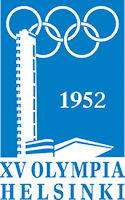 1952 Helsinki Highlights 1952 Helsinki Highlights
- The Hungarians win 53 Gold Medals, 17 Silver, and 34 Bronze!
- Hungarian Water Polo continues to dominate winning 3rd Gold
- The Legendary Soccer "Golden
Team,""The Magnificent Magyars" makes its mark, taking Gold with Ferenc Puskas, Nándor Hidegkuti and Sandor Kocsis!
- The Great Laszlo Papp wins Boxing
Gold again!
- Men's Fencing Team Hungary win 7th Gold
- Fencer Gerevich Aladar continues his Gold medal madness
- Fencer Kovacs Pal wins 3rd Gold
- Fencer Elek Ilona also takes
Silver! Elek won more international fencing titles than any other woman, earning Gold in 1936 and 1948. She was World Champion 10 times!
- "Disabled" formerly right-handed Shooter
Takacs Karoly wins 2nd consecutive Gold Medal becoming first repeat winner
of the rapid-fire pistol event; teammate Szilárd Jun, takes Silver.
Medal |
Name |
Event |
|
Papp László |
Boxing / ökölvívás nagyváltósúly 71 kg |
|
Kovács Pál Ádám |
Individual Fencing / vívás kard egyéni |
|
Takács Károly |
25m rapid fire pistol / gyorstűzelő pisztoly |
|
Kárpáti Rudolf |
Team Fencing / vívás kard csapat |
|
Kovács Pál Ádám |
Team Fencing / vívás kard csapat |
|
Rajcsányi László |
Team Fencing / vívás kard csapat |
|
Papp Bertalan |
Team Fencing / vívás kard csapat |
|
Berczelly Tibor |
Team Fencing / vívás kard csapat |
|
Gerevich Aladár |
Team Fencing / vívás kard csapat |
|
Benedek Gábor |
Modern Pentathlon / öttusa csapat |
|
Kovácsi Aladár dr |
Modern Pentathlon / öttusa csapat |
|
Szondy István |
Modern Pentathlon / öttusa csapat |
|
Antal Róbert |
Team Waterpolo / vizilabda csapat |
|
Bolvári Antal |
Team Waterpolo / vizilabda csapat |
|
Fábián Dezső |
Team Waterpolo / vizilabda csapat |
|
Gyarmati Dezső |
Team Waterpolo / vizilabda csapat |
|
Hasznos István |
Team Waterpolo / vizilabda csapat |
|
Jeney László |
Team Waterpolo / vizilabda csapat |
|
Kárpáti György dr. |
Team Waterpolo / vizilabda csapat |
|
Lemhényi Dezső |
Team Waterpolo / vizilabda csapat |
|
Markovits Kálmán |
Team Waterpolo / vizilabda csapat |
|
Martin Miklós |
Team Waterpolo / vizilabda csapat |
|
Markovits Kálmán |
Team Waterpolo / vizilabda csapat |
|
Szívós István |
Team Waterpolo / vizilabda csapat |
|
Szívós István |
Team Waterpolo / vizilabda csapat |
|
Szittya Károly |
Team Waterpolo / vizilabda csapat |
|
Vízvári György |
Team Waterpolo / vizilabda csapat |
|
Csermák József |
Hammerthrow / kalapácsvetés |
|
Gyenge Valéria |
Swimming breaststroke / úszás 200m mell |
|
Székely Éva |
Swimming freestyle / úszás 400 m gyors |
|
Keleti Ágnes |
Gymnastics Floor / műszabadgyakorlat |
|
Korondi Margit |
Gymnastics Floor / felemás |
|
Hódos Imre |
Wrestling / birkózás szabadfogás 57 kg |
|
Szilvásy Miklós |
Wrestling / birkózás kötöttfogás 73 kg |
|
Szőke Katalin |
Swimming freestyle / 100 m gyors |
|
Littomeritzky Mária |
Swimming freestyle relay / 4x100 m gyors |
|
Novák Éva |
Swimming freestyle relay / 4x100 m gyors |
|
Novák Ilona |
Swimming freestyle relay / 4x100 m gyors |
|
Szőke Katalin |
Swimming freestyle relay / 4x100 m gyors |
|
Temes Judit |
Swimming freestyle relay / 4x100 m gyors |
|
Bozsik József |
Soccer / Labdarugás |
|
Budai II. László (Bednarik László) |
Soccer / Labdarugás |
|
Buzánszky Jenő |
Soccer / Labdarugás |
|
Csordás Lajos |
Soccer / Labdarugás |
|
Czibor Zoltán |
Soccer / Labdarugás |
|
Dalnoki Jenő |
Soccer / Labdarugás |
|
Grosics Gyula |
Soccer / Labdarugás |
|
Hidegkuti Nándor |
Soccer / Labdarugás |
|
Kocsis Sándor |
Soccer / Labdarugás |
|
Kovács I. Imre |
Soccer / Labdarugás |
|
Lantos Mihály |
Soccer / Labdarugás |
|
Lóránt Gyula |
Soccer / Labdarugás |
|
Palotás Péter |
Soccer / Labdarugás |
|
Puskás Ferenc |
Soccer / Labdarugás |
|
Zakariás József |
Soccer / Labdarugás |
|
Kun Szilárd |
Rapid fire pistol / gyorstűzelő pisztoly |
|
Benedek Gábor |
Individual Pentathlon / öttusa egyéni |
|
Elek Ilona |
Individual Fencing / vívás tőr egyéni |
|
Gerevich Aladár |
Individual Fencing / vívás kard egyéni |
|
Novák Éva |
Swimming freestyle / úszás 400 m gyors |
|
Novák Éva |
Swimming breastroke / úszás 200 m mell |
|
Novák Gábor |
Kayak Canoe / kajak-kenu C-1 10,000 m |
|
Parti János |
Kayak Canoe / kajak-kenu C-1 10,000 m |
|
Bodó Andrea |
Team Gymnastics / torna összetett csapat |
|
Karcsics Irén (Kárpáti Irén) |
Team Gymnastics / torna összetett csapat |
|
Keleti Ágnes |
Team Gymnastics / torna összetett csapat |
|
Korondi Margit |
Team Gymnastics / torna összetett csapat |
|
Köteles Erzsébet |
Team Gymnastics / torna összetett csapat |
|
Kövi Mária |
Team Gymnastics / torna összetett csapat |
|
Tass Olga |
Team Gymnastics / torna összetett csapat |
|
Weckinger Edit (Vásárhelyi Edit) |
Team Gymnastics / torna összetett csapat |
|
Polyák Imre |
Wrestling / birkózás kötöttfogás 62 kg |
|
Gurovits József |
Kayak Canoe / kajak-kenu K-2 |
|
Varga Ferenc |
Kayak Canoe / kajak-kenu K-2 |
|
Berczelly Tibor |
Team Fencing / vívás tőr csapat |
|
Gerevich Aladár |
Team Fencing / vívás tőr csapat |
|
Maszlay Lajos |
Team Fencing / vívás tőr csapat |
|
Palócz Endre |
Team Fencing / vívás tőr csapat |
|
Sákovics József (Szecsődi József) |
Team Fencing / vívás tőr csapat |
|
Tilli Endre |
Team Fencing / vívás tőr csapat |
|
Nagy László |
Figure Skating - pairs / műkorcsolya páros |
|
Nagy Marianna |
Figure Skating - pairs / műkorcsolya páros |
|
Berczelly Tibor |
Individual Fencing / vívás kard egyéni |
|
Szondy István |
Pentahlon / öttusa egyéni |
|
Balogh Ambrus |
Pistol / sportpisztoly 50 m |
|
Bodó Andrea |
Rythmic Gymnastics / kéziszer egyéni |
|
Keleti Ágnes |
Gymnastics / felemás korlát |
|
Korondi Margit |
Gymnastics Beam / gerenda |
|
Korondi Margit |
Gymnastics Floor Exercises / műszabadgyakorlat |
|
Korondi Margit |
Gymnastics Combined / összetett egyéni |
|
Bodó Andrea |
Team Rythmic Gymnastics / kéziszer csapat |
|
Karcsics Irén (Kárpáti Irén) |
Team Rythmic Gymnastics / kéziszer csapat |
|
Korondi Margit |
Team Rythmic Gymnastics / kéziszer csapat |
|
Köteles Erzsébet |
Team Rythmic Gymnastics / kéziszer csapat |
|
Kövi Mária |
Team Rythmic Gymnastics / kéziszer csapat |
|
Tass Olga |
Team Rythmic Gymnastics / kéziszer csapat |
|
Weckinger Edit (Vásárhelyi Edit) |
Team Rythmic Gymnastics / kéziszer csapat |
|
Keleti Ágnes |
Team Rythmic Gymnastics / kéziszer csapat |
|
Gurics György |
Wrestling / birkózás szabadfogás 79 kg |
|
Csányi György |
Track and Field / atlétika 4x100 m |
|
Goldoványi Béla |
Track and Field / atlétika 4x100 m |
|
Varasdi Géza |
Track and Field / atlétika 4x100 m |
|
Zarándi László |
Track and Field / atlétika 4x100 m |
|
Földessy Ödön |
Track and Field Long Jump / atlétika távolugrás |
|
Temes Judit (Tuider Judit) |
Swimming Freestyle / úszás 100 m gyors |
|
Róka Antal |
Speedwalking / 50 km gyaloglás |
|
Németh Imre |
Hammerthrow / kalapácsvetés |
Search all
1952 medalists (in Hungarian)
|
Featured
1952 Olympians
 Ferenc Puskas: Ferenc Puskas:
(b. 4/2/1927 Budapest, d.)
The "Greatest
Soccer Player in History"...
"He
played 84 times and scored a world record 83 goals! No player, not even
Pelé, has scored that many goals for a national team." The "Little Cannon," the
"Galloping Major," or the "Left-Foot Magician."
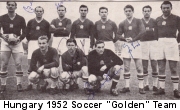 Whichever nickname you remember him by, he exemplified the role of a
striker and shoting. His dreadful left-feet shoot frightened many goal
keepers. It was Puskas who bruised the chest of Korean soccer player Deok-young
Hong, the Goal Keeper of the Korean Team during the 1954 World Cup Soccer
Games. Puskas began his career with Honved, which in the years following World War
Two was the Hungarian army team. Earning an enduring reputation for his deadly left foot, he won an Olympic gold
medal with the national side in 1952 shutting out Yugoslavia by 2-0 in the final with goals by Puskas az Czibor. Led by
Puskas, Hungary recorded one of the most famous victories in soccer
history in 1953 when they became the first continental team to beat England at
Wembley, winning 6-3 in magnificent style. 6 months later, despite German attempts to injure him in an earlier match, Puskás led
Hungary with its incredible 4-year, 33 game winning streak to defeat powerhouse England
7-1 and into the 1954 World Cup finals where favored Hungary lost to Germany after a
controversial call taking away a clear Hungarian goal. Whichever nickname you remember him by, he exemplified the role of a
striker and shoting. His dreadful left-feet shoot frightened many goal
keepers. It was Puskas who bruised the chest of Korean soccer player Deok-young
Hong, the Goal Keeper of the Korean Team during the 1954 World Cup Soccer
Games. Puskas began his career with Honved, which in the years following World War
Two was the Hungarian army team. Earning an enduring reputation for his deadly left foot, he won an Olympic gold
medal with the national side in 1952 shutting out Yugoslavia by 2-0 in the final with goals by Puskas az Czibor. Led by
Puskas, Hungary recorded one of the most famous victories in soccer
history in 1953 when they became the first continental team to beat England at
Wembley, winning 6-3 in magnificent style. 6 months later, despite German attempts to injure him in an earlier match, Puskás led
Hungary with its incredible 4-year, 33 game winning streak to defeat powerhouse England
7-1 and into the 1954 World Cup finals where favored Hungary lost to Germany after a
controversial call taking away a clear Hungarian goal.
The "Golden Team" disintegrated after the 1956 uprising against communist rule in
Hungary was put down by Soviet troops. Puskas, on tour at the time with
Honved, did not return home and instead joined
Real Madrid, where he formed his great partnership with Di Stefano. Puskas won three European Cups, six Spanish championships and two Spanish
Cups with Real. Puskás later became head coach for
team Greece. Read more on our own Sports page.
 Featured
Olympian, Featured
Olympian,
Karoly Takacs:
(b. Budapest, 1/21/1910, d. 1/5/1976)
The
Right-Handed Shooter Who Won With His Left Hand...this "handicapped" Olympian would become the first repeat winner of the rapid-fire pistol event! Karoly Takacs was a member of the Hungarian pistol
shooting team in 1938 when, while serving as a sergeant in
the army, a defective grenade exploded in his right
hand - his pistol hand - and shattered it completely.
After spending a month in the hospital, Takacs
secretly taught himself to shoot with his left hand. The following year he won the Hungarian pistol shooting
championship and was a member of the Hungarian team that
won the automatic pistol event at the world championships.
The next two Olympics, in 1940 and 1944, were cancelled
because of war, but in 1948 Takacs qualified for the
Hungarian Olympic team in the rapid-fire pistol event. He
was 38 years old. Before the competition, the favorite,
world champion and world record holder, Carlos Enrique Díaz
Saenz Valiente, asked Takacs why he was in London. Takacs
replied, "I'm here to learn." Takacs won the
gold medal and beat the world record by ten points. During
the medal ceremony, Díaz Saenz Valiente, who finished
second, turned to Takacs and said, "You have learned
enough." Four years later in Helsinki, Takács
successfully defended his Olympic title to become the
first repeat winner of the rapid-fire pistol event.
Hungary, with its great sporting culture, has a proud history of medal winning "Handicapped" Olympians. Amputee Oliver Halassy won two Gold Medals in Waterpolo in 1932 and 1936 and a Silver in 1928. Fencer Rejto Ildiko, a triumphant "handicapped" Icon, and winner of 7 Olympic Medals (two Gold), was still a Champion in 1999! Rejto participated in FIVE Olympics - 1960, 1964, 1968, 1972, and 1976 - and won 7 medals!
 Featured
Olympian, Eva Szekely (Gyarmati): Featured
Olympian, Eva Szekely (Gyarmati):
(b. 4/3/1927 Budapest, d. )
One of the Greatest Olympic
Swimmers...
Szekely competed in three Olympiads for Hungary. At the 1948
Games, Szekely finished fourth in the 200-meter breaststroke, fifth in the
4x100-meter freestyle, and sixth in the 400-meter freestyle. She returned
to the Olympics four years later at the 1952 Helsinki Games, competed in
two events, and won her first Olympic medal. In the 200-meter
breaststroke, Szekely won her preliminary heat and then set an Olympic
record in the semifinals. In the final, Eva won the gold medal and lowered
her Olympic record again.
 Szekely's
final Olympic Games occured in 1956, when she and her husband, Dezso
Gyarmati (Hungary's water polo captain and "Greatest
Waterpoloist of All Time") left for the Melbourne
Olympics during the first days of the Hungarian revolt against Communism.
Eva later explained that the world turned upside down when: "...we
arrived in Melbourne, we learned that the Russians had come into power...we
had no word of our two-year old daughter, or my parents. I didn't
get any real sleep for a week before I was due to race and lost over
12 pounds. My husband also was extremely worried, of course..."
At the Games, Eva won the silver in the 200-meter breaststroke (2:54.8).
She said of her silver medal: "...even though it was one of the
few times that I have been beaten in competition, considering everything,
I am very proud of the silver medal..." Szekely's
final Olympic Games occured in 1956, when she and her husband, Dezso
Gyarmati (Hungary's water polo captain and "Greatest
Waterpoloist of All Time") left for the Melbourne
Olympics during the first days of the Hungarian revolt against Communism.
Eva later explained that the world turned upside down when: "...we
arrived in Melbourne, we learned that the Russians had come into power...we
had no word of our two-year old daughter, or my parents. I didn't
get any real sleep for a week before I was due to race and lost over
12 pounds. My husband also was extremely worried, of course..."
At the Games, Eva won the silver in the 200-meter breaststroke (2:54.8).
She said of her silver medal: "...even though it was one of the
few times that I have been beaten in competition, considering everything,
I am very proud of the silver medal..."
Between 1940-1958, Szekely set 10 World
records and 5 Olympic swimming records. Her World Records
included the 100-meter breaststroke (1:16.9) in 1951, the
400-meter individual medley (5:50.4) in 1953, and the
400-meter freestyle relay (4:27.2) in 1952. Eva also won
10 World University Championships, 68 Hungarian National
Titles, and held 107 Hungarian National records! In 1952,
the definition of breaststroke was such that the arms had
to move in parallel. Szekely was the first to use the
butterfly stroke when she won the gold at Helsinki. By
1956, the definition had changed and the butterfly was a
medal discipline of its own.
Trivia:
In 1957, Dezso was beaten and left for dead when
the communist puppet regime heard about the family's intention of
defecting. He survived and took Eva and daughter Andrea with forged
passports and fled Hungary to the United States. They returned to
Hungary the following year because they were concerned about Eva's
parents (who remained in Hungary). Dezso continued to compete for
the national water polo team. Andrea Gyarmati, was a 1972
Olympic silver medalist in the 100m backstroke bronze medalist in
the 100-meter butterfly. She later married Mihaly Hesz, the 1968 Olympic canoeing champion.
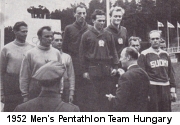 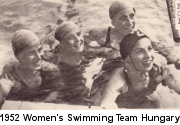
        
  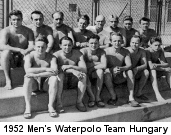
Click for larger images |



